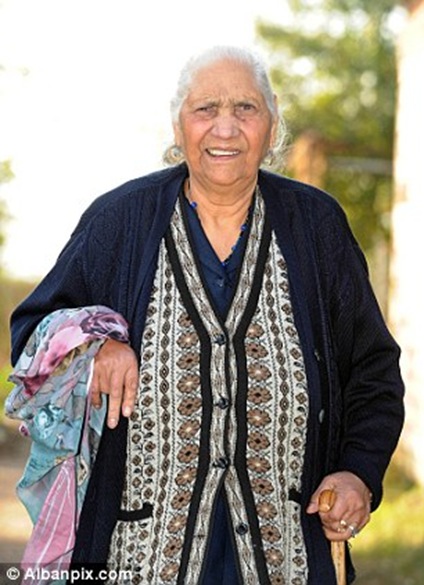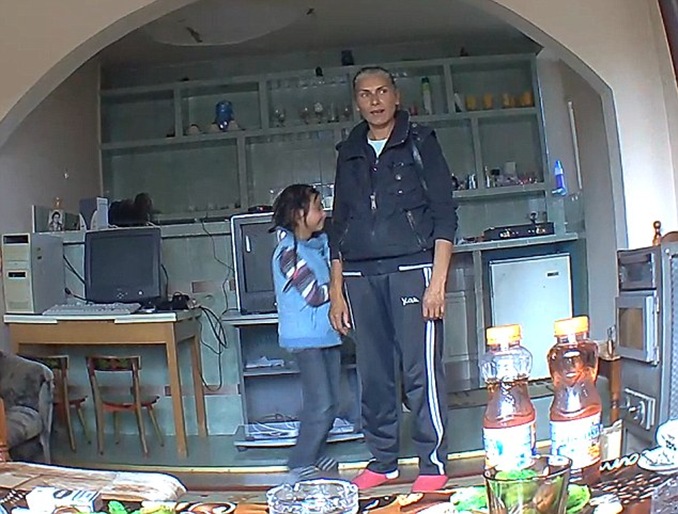Daily Mail
December 1, 2013

A black Mercedes slows to a halt and the driver hurries to open the door for his celebrated passenger.
The tip of a walking stick appears first, then, as it finds the pavement, lean fingers decorated with jewelled rings can be seen gripping its handle.
After a few moments the stick is followed by its owner – a matriarchal old lady wrapped against the winter chill in a thick blue cardigan.
She pulls herself upright as children greet her with cries of delight and a young man obligingly takes her arm.
In this quiet residential district on the fringes of the Bulgarian city of Stara Zagora, 77-year-old Donka Panova is everyone’s favourite Roma grandmother and much revered.
But don’t be fooled by her congenial smile and, above all, don’t get too close . . . she is also Bulgaria’s grande dame of pickpocketing and proud of her sobriquet, Golden Hands.
Down the years Golden Hands has schooled hundreds of children, including her 30 grandchildren and 12 great-grandchildren, in the intricacies of her criminal art – and many of her graduates are now planning to travel to Britain in the New Year when restrictions on Bulgarian and Romanian migrants are lifted.
Sitting in a cafe, her grandson Gospodin Panov, 26, emits a low whistle as he contemplates the rich pickings. ‘All those people in London packed on Underground trains with their arms in the air. It will be too easy!’
Gospodin has experience of England already. ‘I was in Portsmouth a few years ago and made £3,000 in one week pickpocketing,’ he says. His grandmother interjects: ‘I started in 1950, in the Communist era, when things were not so easy.
‘These days, I envy the way our young people can travel all over Europe to make money. But in my day I was the best. I was The Pickpocket.’
Even today, she still likes to keep her hand in, so to speak. ‘Only if I am at the market, though, and an opportunity presents itself.’
Not that she needs the money – her light fingers have made her wealthy. ‘I own five houses and don’t want for anything but it becomes a kind of addiction,’ she says.
In Bulgaria there are about 60 sub-groups of Roma, each with different outlooks and, in many cases, different ways of earning money.
Golden Hands and her family are members of the Kardarashi clan, which number 3,000 in the Stara Zagora region.
Other clans might run prostitution rackets, but the Kardarashi stick chiefly to pickpocketing. ‘We are the most skilled,’ boasts Gospodin. ‘And we rarely get caught.’

To gain access to their secret world, a Mail on Sunday team travelled to Stara Zagora posing as London criminals seeking to establish links with Roma groups ahead of January 1, when the UK border controls lapse.
After a series of meetings with underworld bosses, we were introduced to an English-speaking Kardarashi representative, who gave his name as Kamen.
The families Kamen introduced us to were all unashamed pickpockets but they seemed far removed from the migrants described by former Home Secretary David Blunkett as those who ‘don’t even live in areas where there are toilets or refuse collection facilities’.
The Kardarashi lead ordered, comfortable lives, and compared with other Roma groups they enjoy a high standard of living. They choose to live in the suburbs of Stara Zagora, rather than more ramshackle settlements in the city centre.
In many ways, they are the nearest thing to a Roma middle class and, for the other groups, keeping up with the Kardarashi isn’t always easy.
Even by Roma standards, the clan is particularly insular and conservative. Disputes are always settled internally by a strictly hierarchical leadership and there is little interaction with mainstream authority. The police simply leave them alone.
‘Yes, we train our children to pick pockets but we educate them properly too and want them to get good jobs. Pickpocketing is just part of our heritage.
‘I would settle in England only if I could get a proper job. I can’t speak for everyone but I wouldn’t rely on pickpocketing alone. And we aren’t the type of people described by this politician,’ says Gospodin, referring to Mr Blunkett.
Even so, many Kardarashi do little else but steal and most, including Gospodin, embark on what they call The Journey – a pickpocketing tour of EU countries that can last up to a year.
‘For some, what the new rules mean is that England will now be added to the list of countries we visit,’ he says.
At the same time, he has spoken to many in the clan who have made enquiries abut seeking permanent work in the UK. ‘And they are very tempted by the benefits and welfare system, the way people in England are treated generally. A lot will go in January, others will wait to see how things develop.’
